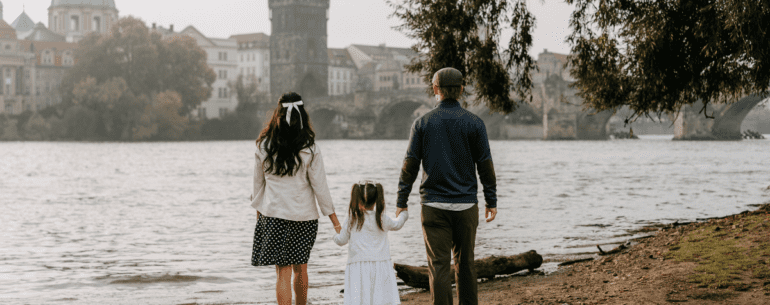When I was in Zambia, one kid was like my shadow. If I turned around, his eyes were locked on me.
I felt like Michael Jordan (maybe sans charisma and all the talent). That’s because when I was 12 years old and MJ was on WGN, I’d stop and watch his every move, even yelling “hold the phones,” as I stood motionless in front of the TV.
Mom would say, “What does that mean?”
I’d laugh. Nobody was calling anyway. Not back when you knew where your friends were by how many Huffy’s and Mongooses were strewn about somebody’s front yard.
Back to the kid. He was born with a life-altering condition, unbeknownst to him. He was curious and friendly. Like most of the kids—he genuinely wanted to connect.
These kids walk up to you unthinkingly. More importantly, they engage, making them seem more mature. They’re kind and not self-conscious.
I’ve come to believe that rare combination of confidence & kindness is mostly just being less conscious of self. In other words, caring about yourself less. In other other words, self-less.
Kids Like to Help
Kindness can be as simple as inquiring about others and listening intently. Not only will that person like you more for asking (and listening), but active listening has become so rare in our selfie-social media world that it’s damn near intoxicating for someone to be looked in the eye while talking about themselves.
In Africa, they’ve developed social skills, honed over centuries, that you don’t encounter anywhere else [that I know of].
They enjoy serving others.
With this kid, if I dropped something, before I could bend to pick it up, the boy would have it in his outstretched hand.
My daughter does that now. Kids like to help.
Help Others Help You
Here’s something I had to learn the hard way. When someone wants to help, you should let them. If you don’t, you’re depriving them of the joy that many experience when helping others.
By allowing my little girl to help with something I could easily do myself—I’m fostering in her a willingness to help and fulfilling her desire to serve others. Not to mention it gives kids a sense of autonomy and independence.
In fact, her smiles when doing things for others might be what I’m most proud of. Sometimes I’ll let her do things for me that aren’t helpful—just to see her smile.
For example, when she can see I’m in pain, she’ll grab her “doctor kick,” pull out her “stefoscope” and apply her favorite Blippi band-aid where it hurts.
Come to think of it. That sort of care is better than any medicine.
Africa: The Good and Bad
You can’t believe the destitution you witness traveling around sub-saharan Africa.
The continent has a long history of political instability, racial and ethnic strife. Combine that with its reputation for war, disease and extreme poverty, and it’s no wonder few people visit.
The thought of traveling to any part of Africa is intimidating. It requires a trip to the doctor for immunization shots and prescription for anti-malaria pills.
Nelson Mandela once pleaded at the London School of Economics not to judge the achievements of Africans by Western standards. A child’s development is severely impacted when raised in poverty.
True poverty. Not to be confused with “food insecurity” or arbitrarily assigned poverty lines in America, which seem to serve those in power more than those deemed to be poor.
“Children go to school without learning aids. Taught in a language which is not theirs, by teachers often not so very qualified…poor children eating porridge at lunch, and dinner, unable to concentrate. Large families with little room to move about. A child shares a room with about three or four others. No table, no chairs. Doing their homework on the floor.” – Nelson Mandela
Zambia is a landlocked country on a vast continent. So big you could fit three America’s in Africa with room to spare.
But it’s not the size that makes the place special. It’s the smiles. The kindness. It’s the greetings you get from people who don’t know you.
That’s not to say Africa doesn’t have a dark side. There are parts where it can be awfully brutal. It was rare to see a house in urban areas not protected by walls topped with shards of glass to keep out would-be looters. People still die from poor drinking water, disease and lack of food.
A New Test of Character
It’s been said the true test of one’s character is what you do when nobody’s watching.
Perhaps the ultimate test is whether you return the shopping cart to where it belongs after grocery shopping.
Put it this way. There’s no reward for putting the cart in its proper place. And it’s not illegal to leave it next to your car. But rolling the basket to the rack and shoving it underneath the last one is a small inconvenience that only serves to benefit others.
Random acts of kindness get rewarded unexpectedly. And being on the receiving end is a high that can’t be obtained through molecules.
Whether you attribute being on the receiving end [of kindness] to karma or clean-living, you’ve gotta trust that you’ll reap what you sow.
It’s one of the reasons I’ve long-advocated for handwritten personal notes, which mean more to the recipient with each added means of electronic communication.
Plus, writing is a reward in itself. Ask me how I know!
I’ve kept every handwritten note anyone’s taken the time to write to me. Here’s one I received from the kid in Africa.
0′ how are you by this time? I can just say thank you for helping my family many months. I didn’t know that someone like you can do all this. May God do something on you.” – L. Zyamini
May God do something on us all.




Return the damn cart. Let people merge into traffic. Pick up a piece of litter. Yes, Karma AND a 3-second decision that – if done at scale – can make life better and easier and more beautiful for everyone.
Think about the time wasted in a line of traffic because people won’t let others merge. If we all could merge, we’d all keep moving.
Simple.
Couldn’t agree more – I’ll join your “merge more” movement.